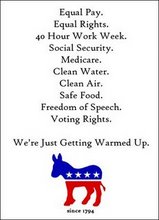I used to understand that it was futile to ponder on the outcome of the political process. Deep down inside, there is the knowledge that these things are beyond my level of comprehension, and most of the time that knowledge saturates the surface also. Besides all that, I hadn't really cared that much for a long time.
One day last year, Charlotte Garrido ( a candidate for County Commissioner) stopped by to let me know she was running for office and was interested in my thoughts about a number of issues. She asked extremely pertinent questions, and listened intently to my answers while making notes in her little book. As soon as she left, I went on with my day and pretty much filed the memory of Charlotte's visit somewhere under Z.
A few days later, she called me with feedback on a couple issues I considered important... and I found myself drawn into a level of political interest I hadn't felt for many years. Charlotte's bid for office was not successful, but her impact on me was. Our brief encounter showed me that politics, especially at the local level, could be very different in a positive way.
I am remembering this encounter with Charlotte because it rekindled an interest in pondering, and a pile of additional fuel to get that interest fully ablaze came in the form of an interview in Mother Jones.
Food Chains, Dead Zones, and Licensed Journalism
Michael Pollan, Interviewed by Russell Schoch
This article started with a discussion about food and some interesting environmental issues, but touched on the following:
Was there a favorite writer you edited at Harper's?
Yes: Walter Karp, who wrote extensively for the magazine before his death in 1989. He was a terrific political writer--he wrote things that sort of sizzled in your hand--and he set the political tone for the magazine. One of his chief virtues was his understanding that you have to look at what politicians do rather than at what they say. We don't tend to do that. Journalists go to politicians and ask them what their actions mean. That's kind of weird. As a result, in the mainstream press what is regarded as important is what politicians tell us is important, and what things mean is what those same politicians tell us they mean.
But Walter Karp always kept his eyes on the political actor's deeds, not on his words. He understood that journalism, in this country, is largely licensed by politicians, by the leadership of the two political parties.
I did a little research on Walter Karp this morning, and the little I have read... so far... has really elevated my desire to know more.
I discovered that, as usual, I am on the trailing edge of an issue that others have already discussed intensely in the blog world and elsewhere for at least the past year. I will try to catch up over the next week or so, but have bookmarked so many sites and articles, I know it will take longer.
Saturday, February 05, 2005
Subscribe to:
Post Comments (Atom)





No comments:
Post a Comment